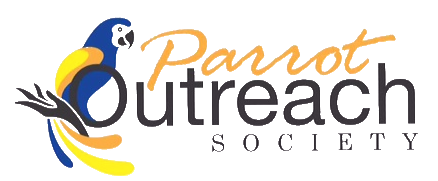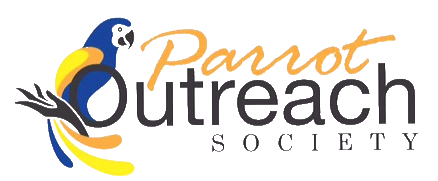Society Protocols, Goals and Objectives:
INCOMING BIRDS: Provide responsible transfer of ownership.
1. Detailed form of parrot’s medical and social history.
2. Parrot Release form – legal document and transferring ownership of parrot.
3. Counseling with parrot owner to attempt to resolve the problem that is causing relinquishment.
4. Encourage relinquishment donation.
RECORDS: to create an accurate and individualized record of parrot.
1. Each bird has its own file for medical, psychological and social record kept.
2. Each bird is added to the society’s log to track.
QUARANTINE:
1. 30 days minimum, more as required by situation and vet recommendation.
HOUSING/HUSBANDRY:
1. Individual cages appropriate to species, with appropriate bar spacing and size.
2. Environmental enrichment with toys of various textures, color and size.
3. Nutritious diet that includes: pellet, seed, fresh fruits and vegetables, mash mixes, birdie breads and nuts.
4. Cages cleaned daily with hot soapy water. Floors mopped with bleach water daily.
5. Outdoor flights cleaned daily.
REHABILITATION: to promote a well adjusted and happy parrot and decrease destructive behavior.
1. Nutritious diet to boost immune system.
2. Environmental enrichment.
3. Daily interaction and socialization.
4. Meet individualized needs.
5. Promote trust and confidence.
ADOPTION: to provide long term, stable placement for pet birds in a loving home. Please note: we only adopt in the state of FL, no exceptions!
1. Structured adoption application.
2. Fee to join parent organization and educational packet.
3. Screening via phone or face to face conversations.
4. Home visit mandatory.
5. References verified.
6. Records search for cruelty or neglect to animal complaints/charges.
7. Adoption donation requested.
8. Continued support and follow-up via email or phone.
9. Adoption contract.
FOSTER CARE: find dedicated and continuously monitored temporary and permanent homes with specific standards of care and reporting requirements.
1. Foster Home Release form.
2. Interest in welfare and care of parrots.
3. Proper attention to the bird’s environment.
4. Nonsmoking environment.
5. Agree to continued monitoring of the bird after placement.
6. Agree bird is NOT to be used for breeding.
7. Agree to maintain conditions that allow the bird to thrive.
8. Provide bird care instruction packet specific to species.
9. Agree to species specific dietary needs and proper environmental conditions.
RESCUE: bring a bird in an acute life threatening situation or is in immediate need of assistance into a safe environment.
EDUCATION/OUTREACH: to increase the awareness of aviculture and the needs of parrots.
1. Provide printed material to the public.
2. Maintain website.
3. Make public education appearances.
AUTHORSHIP OF ARTICLES AND BOOKLETS: to promote awareness.
1. Foster and adoption education packets.
2. Booklets/pamphlets provided to the public.
3. Newspaper articles.
SYMPOSIUMS AND CONFERENCES: to maintain continuing education of society members and fosterers.
1. Members to attend conferences offered by other parrot welfare organizations.
2. Maintain affiliations with other like organizations.
NETWORKING: to maintain availability of assistance in our endeavor as needed.
1. Maintain working relationships with other local organizations.
2. Maintain membership with AFA to provide national assistance as needed.
We offer a safe haven for pets of domestic violence victims. This program is free of charge, 90 days of foster care, with each case reviewed at the end of 90 days for need of an extension. All birds in this program are housed off site for the safety of the animal and the humans involved.

